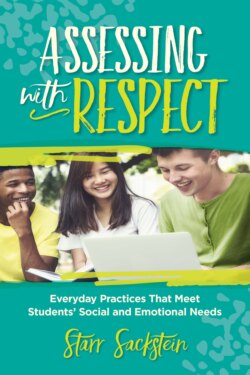Читать книгу Assessing with Respect - Starr Sackstein - Страница 10
На сайте Литреса книга снята с продажи.
Building Relationships to Support Learning
Оглавление. . . . . . . . . . . . . . . . . . . .
Learning can be a scary proposition for some students, and when their basic needs aren't met, the likelihood of doing it well is markedly low. To help all students succeed, teachers and school communities need to build deeper connections with students, enabling better understanding of not only surface needs but also core social and emotional needs that can affect learning in many ways. Although it may sound like a cliché to say that relationships are key to learning, the idea has become a cliché because it is true. We simply can't undervalue the importance of intentionally building relationships in schools to increase student success.
Aside from the inherent benefits of relational trust, schools that build great relationships develop assessment-capable learners who not only succeed in the conventional sense—completing classwork, contributing productively to class discussions, developing knowledge and skills at or above standards—but also potentially actualize the best versions of themselves. Classrooms that make relationships a high priority create the conditions for deeper curiosity and greater accessibility to individual student and teacher expertise. Quality relationships can increase a student's ability to learn more deeply by allowing for positive risk taking. How much students will risk in their own learning can shape the way we construct and conduct assessments throughout the year.
Relationship building requires that we explore ourselves, including our personal biases and how they affect our ability to work with students. Taking a deeper look at what we know and value and how we express our beliefs will affect our ability both to build better relationships with all invested parties—relationships that are more empathetic and humble—and to model that process.
This chapter addresses CASEL's core competencies of relationship skills and social awareness. CASEL (2020) defines relationship skills as follows:
The abilities to establish and maintain healthy and supportive relationships and to effectively navigate settings with diverse individuals and groups. This includes the capacities to communicate clearly, listen actively, cooperate, work collaboratively to problem solve and negotiate conflict constructively, navigate settings with differing social and cultural demands and opportunities, provide leadership, and seek or offer help when needed.
It defines social awareness as follows:
The abilities to understand the perspectives of and empathize with others, including those from diverse backgrounds, cultures, and contexts. This includes the capacities to feel compassion for others, understand broader historical and social norms for behavior in different settings, and recognize family, school, and community resources and supports.
Addressing the two competencies together acknowledges their interlocking and complementary characteristics. Social awareness is a foundational component of relationship skills, and, in turn, building relationships contributes to continual development of social awareness.
